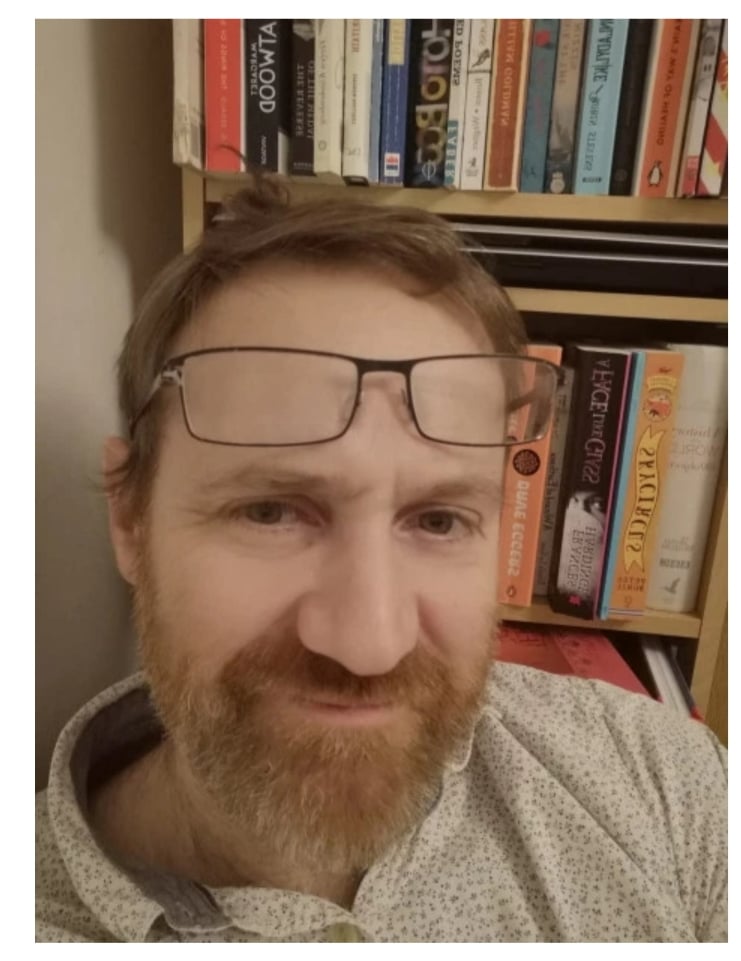The Reading Realm Blog Series: Educators doing extraordinary things
“Nothing, but nothing, beats gathering a group of children together and telling a story. Not from a book but from the heart – person to person. I’ve been lucky enough to tell stories to children and adults in classrooms, round fires, by torchlight, and under the shade of a giant mango tree.”
 Name: Ed Finch
Name: Ed Finch
Twitter handle: @MrEFinch
Link to blog/website: mrefinch.wordpress.com
What is your current position?
I’m a teacher with some management responsibilities but most of the time I’m in class teaching. I get to spend time with years four, five and six mostly teaching music, computing and P.E. – I get to teach some of everything else on a Friday when I’m in year six all day.
When, how and why did you get into education? What did/do you want to achieve?
I stumbled into education in my thirties after a decade of trying – with no success whatsoever – to make a career in the theatre. After getting sick of a stream of day jobs, I decided to take a break and went to teach in Ethiopia with VSO for a couple of years. I found that I enjoyed the teaching and that I wasn’t awful at it and – after a few more adventures – accepted my certain fate and qualified as a primary teacher. I’d hated school myself. Even on a bad day, I hope that the children we care for at Larkrise have a less horrible experience than I had. If I manage that at least I haven’t done too dreadful a job.
How do you feel the education landscape has changed since you started in your role?
I’ve been teaching at my current school for fourteen years. In that time the standard of teaching has improved very markedly – we ensure far better outcomes than we did when I first joined. Running counter to this has been the story of the last few years of underfunding compromising and undermining our capacity to care for our pupils. Many schools are on the verge of being financially non-viable and we can no longer rely on the support of our LA: those services are almost entirely gone. In these times we really come down to a teacher, thirty children and a room.

“My mother read to me every bed time for the first years of my life – I remember the Narnia stories, a few Roald Dahl’s and all of the ‘Swallows and Amazons’ series.”
What are your earliest memories of reading and writing?
I remember being filled with enormous pride that I could both read and write the word ‘zoo’. It’s a handy word to have up your sleeve and if you’re going to restrict your writing to just one word I think ‘zoo’ is a great choice. Sadly, I also remember my brother and my three sisters, all older than me, pointing out that I’d written it ‘ooz’. My mother read to me every bed time for the first years of my life – I remember the Narnia stories, a few Roald Dahl’s and all of the ‘Swallows and Amazons’ series.
How do you try and foster a love of reading in children?
I lead on the Storytelling Curriculum at Larkrise which has been a feature of our school for a decade now, with huge positive effects most particularly on our writing outcomes. In my role across the school, I get to tell a lot of stories and share my love of books. I do the same for my colleagues and have, I think, made a difference to the seriousness with which reading and literature are taken in the school community as a whole. Certainly, more children than ever are eager to tell me what they’re reading and give me recommendations for my own further reading.
“Certainly, more children than ever are eager to tell me what they’re reading and give me recommendations for my own further reading…”
What has been your most successful reading or writing lesson or activity with children?
Nothing, but nothing, beats gathering a group of children together and telling a story. Not from a book but from the heart – person to person. I’ve been lucky enough to tell stories to children and adults in classrooms, round fires, by torchlight, and under the shade of a giant mango tree.
What advice would you give to parents whose children say they don’t like reading?
I’d say don’t be precious about what they’re reading. The Beano, the Argos catalogue, football magazines – it’s all good reading. I’d also say I’m yet to meet the child who doesn’t like to be read to so, if your child doesn’t want to read, you can read to them and make sure that reading becomes associated with that lovely, snuggly, goodnight feeling.

What books do you remember from your childhood? Do you have a favourite?
The books that most rocked my world as a child were the Narnia series by C.S. Lewis. I believed in that world almost more than I believed in my world. I’m not such a big fan of them now, though I retain huge gratitude to them for making me a reader. The book I loved as a child which stays with me most deeply in adulthood is Phillipa Pearce’s ‘Minnow on the Say’.
What was the first book that made you cry?
I remember crying at one of the Moomin books when I was in the equivalent of Year 2. I still weep at them a little now from time to time. They’re quite impossibly beautiful.
What authors did you dislike at first but grew into?
There’s a good few authors, some of them very popular indeed, whose work just doesn’t do it for me. I can’t think of any who have brought me round. The qualities that I really valued as a child are still largely the qualities I enjoy now. Sensitive use of language and well managed atmosphere will always count above pacy plotting for me. Insightful character realisation will always trump tricksy gimmicks.

“She’s a real storyteller from head to toe.”
What’s your favourite under-appreciated novel?
Despite winning most of the prizes available in the world of children’s literature, I still think that Geraldine McCaughrean is hugely underrated. I love all of her books – at least all the ones I’ve read – but for starters try ‘The Kite Rider’. She’s a real storyteller from head to toe.
Have you ever experienced reader’s block?
In my twenties I read lots of Literary Fiction until one day I was absolutely sick of it. For a while I didn’t read any fiction at all. I carried on reading history and travel writing but I was quite, quite sick of fiction. That changed when I discovered Patrick O’Brien’s ‘Master and Commander’ series. I still happily reread those!
Are you drawn to a particular genre or type of book or do you read a variety of genres?
I’ll read almost any genre and I challenge myself to broaden my interests continually. I read a great deal of children’s literature partly because I think its important teachers are up to date with publishing, but mostly because I enjoy it so much. I read a good deal of poetry and I love good nature writing. Since the wonderful Martin Galway put me onto her, I’ve been reading a lot of Ann Tyler who seems to know and understand the insides of people’s heads almost scarily well.

What book are you currently reading?
Last night I finished ‘Running on the Roof of the World’ by Jess Butterworth. When I finish writing this, I intend to start ‘Kick’ by Mitch Johnson.
Where’s your favourite place to read?
The best place to read is at the bottom of my garden under the shade of the apple tree. If it’s cold, I’ll light a fire. It’s nice down there, you can join me and we can read together.

Which three books would you recommend to primary school aged children and why?
‘The Owl Who Was Afraid of the Dark’ by Jill Tomlinson. The first ‘chapter book’ I read and boy was I proud of myself.
‘Bambert’s Book of Missing Stories’, Pie Corbett put me on to this one. It’s strange and wonderful and has a million ways to spring off into children’s own writing.
‘Wolf Wilder’ by Katherine Rundell, ‘Once there was a dark and stormy girl’. This book is just about perfect. The world of ‘Old Peter’s Russian Tales’ collides with the world of the Bolshevik revolution in a story with warriors, dancers and wolves with gold tipped ears.
Finally: in one sentence, what does reading for pleasure mean to you?
Reading for Pleasure means every child, and adult too, finding their own way towards making sense of their world through language and story in a way that works for them. Whether it’s fact, fiction, humour, poetry… whatever works for our pupils we can help them find their way towards it and share their joy at the steps they take.



One Response
A treat to read Ed. A treat to read, Ed.